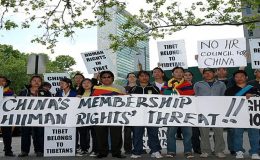 On 6 November 2018, China will undergo its 3rd cycle Universal Periodic Review (UPR) at the United Nations Human Rights Council.
On 6 November 2018, China will undergo its 3rd cycle Universal Periodic Review (UPR) at the United Nations Human Rights Council.
The process, which takes place every 4 and a half years for each UN State, entails a China delegation presenting its claimed improvements on human rights to other UN States. Other States then have the opportunity to respond by raising concerns about human rights abuses under Chinese rule, and making recommendations on how China should address those violations.
Since China’s second Review in 2013 there has been a significant deterioration in the human rights situation in Tibet, and it is currently ranked as the second most oppressed territory in the world, after Syria. Tibetans are discriminated against and denied a wide range of rights, including freedom of religion, expression, association, assembly, and movement. China exercises tight control over the passage of both information and people within Tibet, and their access in and out of Tibet, in a bid to limit international exposure of these human rights violations.
China continues to fail in the implementation of even the simplest of policies to protect Tibetans’ human rights, including recommendations accepted in 2013, and has instead enacted policies that further impinge upon the rights of Tibetans, and undermine its engagement with the international human rights system.
Earlier this year, Tibet Groups submitted summaries of human rights violations in Tibet to the Human Rights Council, detailing cases of arbitrary detentions, torture deaths in prison, as well as widespread violations of Tibetans’ freedom of expression, movement and religion.
It is vital that governments use this opportunity to put forward robust recommendations about Tibet in this key multilateral forum.
Please contact your Foreign Ministry NOW and urge them to express concern about the dire human rights situation in Tibet among the topics raised at the UPR. We have provided a sample letter and links to briefing papers and recommendations that you can either print and send or share as links in the letter.
A SAMPLE LETTER can be found here, and can be translated and adapted and sent directly to your Foreign Ministry. Please also share the briefing papers and recommendations, which can be found via the links below:
2-page Tibet-specific UPR Briefing
Tibet-specific Recommendations
Suggested Advanced Questions
Full Joint UPR Submission
Your Foreign Ministry Contact can be found here
Please let us know if you send a letter and most importantly if you receive a response by filling in this short questionnaire.




